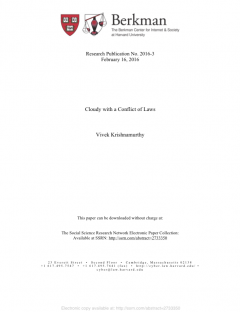
Cloudy with a Conflict of Laws
How Cloud Computing Has Disrupted the Mutual Legal Assistance Treaty System and Why It Matters
Abstract:
As more and more of our lives are lived online, so too are those who live lives of crime. Like everyone else, criminals of all stripes are increasingly using online services of all kinds to plan and commit their wrongful acts. Evidence of crime that not so long ago was on-the-ground and physical is now increasingly in-the-cloud and digital. All this has thrown the law parcelling the authority to search and seize among different jurisdictions into confusion, as clouds of data — like those in the sky — are everywhere and nowhere at once. Unless some clarity is brought to this situation and soon, the future of cloud computing as a unified global phenomenon may be hazy indeed.
This paper describes how the fractal complexity of cloud computing’s physical geography has fractured the system of Mutual Legal Assistance Treaties (MLATs) that arose during the jet age to help shuttle evidence of crime across borders. It explains why the territorially-based MLAT system fundamentally doesn’t work with the physical, technological, and corporate structures that are used to deliver cloud-based services, and how the resulting problems threaten their continued global nature. It highlights the role played by US laws, companies, and government institutions in exacerbating these difficulties that, ironically, have now been visited on the US government itself in the Microsoft Ireland case. It then finally sketches some elements of a potential solution based on principled US leadership that recognizes the legitimate interests of other governments.
